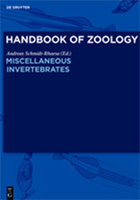Handbook of Zoology
Handbook of Zoology: Miscellaneous Invertebrates
 This volume of the Handbook of Zoology summarizes "small" groups of animals across the animal kingdom. Dicyemida and Orthonectida are enigmatic parasites, formerly united as "Mesozoa" and their position among the multicellular animals is still not known with certainty. Placozoa are small, flat marine animals which provide important information on metazoan evolution. Comb jellies (Ctenophora) are esthetically fascinating animals which cause considerable discussion about their phylogenetic position. Seisonida are closely related to rotifers and acanthocephalans. Cycliophora were discovered and described as one of the last higher taxa and surprise by their complex life cycle.
This volume of the Handbook of Zoology summarizes "small" groups of animals across the animal kingdom. Dicyemida and Orthonectida are enigmatic parasites, formerly united as "Mesozoa" and their position among the multicellular animals is still not known with certainty. Placozoa are small, flat marine animals which provide important information on metazoan evolution. Comb jellies (Ctenophora) are esthetically fascinating animals which cause considerable discussion about their phylogenetic position. Seisonida are closely related to rotifers and acanthocephalans. Cycliophora were discovered and described as one of the last higher taxa and surprise by their complex life cycle.
Kamptozoa (= Entoprocta) are small sessile animals in the sea and sometimes also in freshwater. Arrow worms (Chaetognatha) play an important role as predators in the plankton, but they also include benthic forms. Pterobranchia and acorn worms (Enteropneusta) belong to the deuterostomia and are related to echinoderms. In particular enteropneusts play an important role in understanding deuterostome evolution. These chapters provide up to date reviews of these exiting groups with reference to the important literature and therefore serves as an important source of information.
- Andreas Schmidt-Rhaesa (2019): Handbook of Zoology. Miscellaneous Invertebrates, Berlin: De Gruyter 2019, ISBN: 978-3-11-048927-9, 430 pages, www.degruyter.com

